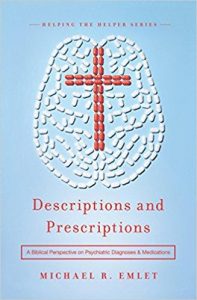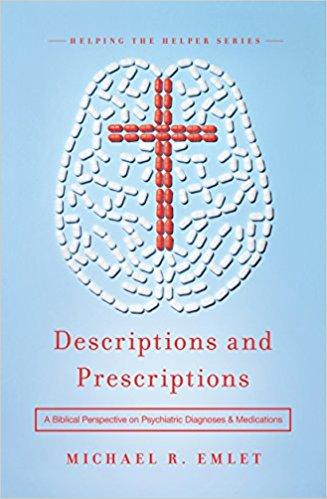Psychiatric labeling and medicine: Doesn’t the average biblical counselor need a better understanding of medical matters? In his book Descriptions and Prescriptions: A Biblical Perspective on Psychiatric Diagnosis & Medications, author Mike Emlet encourages a balanced, “just right” approach. This book review by Nate Brooks appeared first here on The Biblical Counseling Coalition website and is used with permission. (Edited for length. –Ed.)

Whether we like it or not, counseling is complicated. Like other aspects of practical theology, counseling touches categories of life where there is just less revelation to provide perfectly clear, undeniable, once-for-all-delivered-to-the-saints type truth. Counseling is often a blend of systematic theology, hermeneutics, ethics, biology, neurology, pharmacology, philosophy, scientific theories, sociology, criminology, and all kinds of other fields.
Most biblical counselors come from a background of theological training. This is good. Theology and biblical application are indeed the foundation of wise biblical counsel. But that relative uniformity of training makes experts in other fields who also share a biblical vision for counseling doubly valuable. Mike Emlet’s new book, Descriptions and Prescriptions: A Biblical Perspective on Psychiatric Diagnoses and Medications, exhibits the kind of wisdom that enhances our knowledge of medical matters. And it raises the quality of our care for others.
Descriptions and Prescriptions divides neatly in two sections. The first half of the book explores the realm of psychiatric diagnoses. Emlet hopes to move counselors who are either too warm or too cold towards psychiatric labels towards the Goldilocks Zone of “just right.”
Psychiatric Labeling Explained
Psychiatric labeling is not particularly well understood by the population as a whole.
Emlet observes, “In our medicalized and pharmacologically-driven culture, the average person often assumes that each diagnostic entity is primarily caused by a clear and specific brain dysfunction” (p. 20) [emphasis in original]. The impact of this assumption is far ranging.
Counselees with a specific diagnosis tend to assume that their symptoms are caused by some broken organic system in their body. They also may assume that they are victims of biology and biological cures are therefore necessary for their deliverance. However, the DSM “does not claim to know the causes of each of the entities it describes” (p. 24). Psychiatric labels are identified clusters of symptoms and not indicative of a particular sickness or illness.
Here lies the benefit of using psychiatric labels.
Our goal as counselors is to “know the person in front of you as well as you possibly can” (p. 49). Emlet agrees that a wise counselor may be able to identify all the symptoms present in a person without the psychiatric label. However, he also suggests that such an assumption may overconfidently assume our skill and sometimes take far too much time. Properly understood, psychiatric labels can help a counselor understand categories to work in. This is provided that they are used as a description of symptoms and not a statement of causes.
Psychiatric Prescriptions and Use of Medicine

The second half of the book moves from “descriptions” to “prescriptions” – understanding psychiatric medication. Emlet seeks to once again inhabit the Goldilocks Zone, neither warmly welcoming medication as a panacea nor icily rejecting it as unspiritual. He equates psychoactive medication with common grace. He writes,
I believe it is right to view the development of psychoactive medications as a good gift from God, an extension of the ruling and stewarding function he gave to humanity at creation” (p. 79).
How does one know whether they’re too warm or too cold towards psychoactive medication? The key is the motive and the purpose. Counselees may rely upon medication to take away symptoms, such as depression and anxiety. And they may not desire to investigate the reasons behind such troubling emotions. Doing so denies them the opportunity to grow before the Lord. It treats the medication as a functional savior.
Yet, refusal to take medication can subtly be a demonstration of unrighteousness. Thinking “I should be strong enough without medication” may be the words of an autonomous heart refusing to admit weakness and need (p. 82). Medication is neither a savior nor adversary. It is a tool that may relieve extreme suffering so that spiritual growth may take place.
“We Need More Books Like This”
Given Emlet’s knowledge of medical matters, I do wish he would have addressed medical research that questions the safety of psychotropic medications. Robert Whittaker (Anatomy of an Epidemic), Joseph Glenmullen (Prozac Backlash), and others have published substantial accusations about the harm such medication can produce. Emlet’s only reference to this debate is in one footnote, recommending two books from opposite viewpoints. Engaging with the issue of possible long-term damage caused by psychoactive medication would have been profoundly helpful in a book that directly addresses the biblical warrant for taking them.
Readers will also likely disagree on whether Emlet’s positions land in the “Goldilocks Zone.” Some will find him too warm, still others too cold. Yet the book is worth reading regardless.
The first half offers a clear and thoughtful analysis of how we interact with psychiatric labels. The more clearly we understand the system, the more we can help our struggling counselees. The second half offers an apologetic for the restrained and targeted use of psychoactive medications within the categories of God’s dominion and God’s goodness. This position is important to read. This topic of psychoactive medication is one where less light falls from authoritative revelation.
Descriptions and Prescriptions is enlightening and challenging. It advances the conversation in controversial areas of biblical counseling. We need more books like this.
Nate Brooks serves as the Coordinator of the Christian Counseling Program at Reformed Theological Seminary – Charlotte. Nate is a Ph.D. student in Biblical Counseling at Southwestern Baptist Theological Seminary. He counsels and teaches at Oakhurst Baptist Church in Charlotte, NC, where he lives with his wife and sons.












